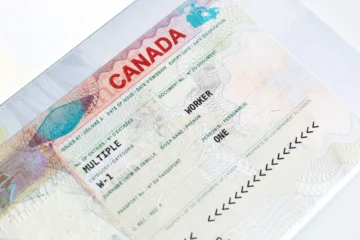Table of contents
- Common Reasons for a Study Permit Application Refusal
- 1. IRCC questions your letter of acceptance
- 2. IRCC questions your ability to financially support yourself
- 3. IRCC questions whether you will leave the country after your studies
- 4. IRCC questions your choice of study program
- 5. IRCC questions your travel or identity documents
- 6. IRCC has noted poor or vague documentation
- 7. IRCC suspects the provided documentation misrepresents the application
- What Can You Do If Your Study Permit Is Refused?
- Judicial Review of Your Student Visa Refusal
For many international students, studying in Canada is a dream come true. Receiving that letter of acceptance from a Canadian designated learning institution (DLI) can feel like the hard work is behind you. But, according to Immigration, Refugees and Citizenship Canada (IRCC), roughly 30% of all Study Permit applications are refused.
If you are a foreign national student applicant who has been refused a Canadian Study Permit you find yourself in a crushingly disappointing and frustrating situation. You’ve already been accepted into a Canadian university, college, or other designated institution, and have prepared your application for a permit with care; but something has gone wrong. In this article we outline the Judicial review process.
Common Reasons for a Study Permit Application Refusal
In most cases, IRCC will provide you with a letter that outlines the reasons for the refusal. Here are seven common reasons why IRCC may refuse your Study Permit application:
1. IRCC questions your letter of acceptance
Before you are can apply for a Study Permit in Canada you must receive a letter of acceptance from a Canadian designated learning institution (DLI). If the visa officer doubts the authenticity of your acceptance letter, or that you have met the program requirements, your letter of acceptance may be rejected.
2. IRCC questions your ability to financially support yourself
You must demonstrate that you have enough money to pay for your trip to Canada, pay your tuition fees, support yourself while you are studying and cover return transportation. If any family members will be staying with you in Canada, you must demonstrate that there is money to cover their expenses as well. The IRCC will usually ask for six months of bank statements as proof that you have enough “show money”.
3. IRCC questions whether you will leave the country after your studies
You must convince the immigration officer that your primary intent in coming to Canada is to study and that you will leave Canada once your study period is complete. Dual intent is a situation where you are applying for a permanent residence in Canada and also for a student visa. In cases of dual intent, you must demonstrate that if your permanent residence application is denied, you will leave the country when your student visa expires.
4. IRCC questions your choice of study program
If the immigration officer does not understand the logic of your choice of program, your application could be refused. If your choice of program does not align with your past education or work experience you should explain the reason for your change of direction in your personal statement.
5. IRCC questions your travel or identity documents
You need to provide a complete record of your travel history. If your identity documents are incomplete or there are blank spaces in your travel history, IRCC may determine that you are medically or criminally inadmissible to Canada.
6. IRCC has noted poor or vague documentation
You must gather all requested documentation, ensuring clarity and adequacy to showcase your genuine intent as a student. Poor or incomplete documentation and vague explanations may fail to provide a clear picture of your intent.
7. IRCC suspects the provided documentation misrepresents the application
If the visa officer suspects that a document misrepresents your application, they may deem you inadmissible or perceive fraudulent intent. It’s crucial to present your information clearly, fully, and truthfully.
What Can You Do If Your Study Permit Is Refused?
If IRCC rejected your study permit application, you can address the reasons for the refusal in a new application or consider applying for a judicial review to challenge the decision. In the majority of review cases, working with an experienced immigration consultant or visa specialist to prepare and re-submit a much stronger application can lead to a higher chance of approval.
If the problem does not appear simple to rectify, or the reasons IRCC provided seem unfair, it may be time to consult an immigration lawyer for assistance with an official review of the decision. In many cases, a refusal of a study permit is the result of failing to fully satisfy one or more of the eligibility criteria. If it can be proven that you do satisfy the criteria, you have grounds to apply for a judicial review by the Federal Court of Canada.
Judicial Review of Your Student Visa Refusal
Understanding Judicial Review
The Judicial Review process in Canada is under which executive, legislative and administrative actions are subject to review by the judiciary. A judicial review is not an appeal. It is an application to the Federal Court asking it to “review‟ a decision already made by an administrative body, which the applicant believes was unreasonable or incorrect. The applicant seeks to challenge a decision adverse to their interests.
Standards of Review
The reasonableness standard is the default and maintains that the decision can fall within a range of certain possible and acceptable outcomes. In some limited circumstances, the correctness standard may apply instead, due to constitutional questions, questions of central importance to the justice system or questions that concern jurisdictional lines. The judicial review of a visa officer’s refusal of a study permit is based on the standard of reasonableness.
The court can’t consider new evidence. Only existing evidence with clearer explanations from the applicant or lawyer is permissible. Self-represented applicants rarely achieve success. If the application under is judicial review itself is deficient, a better solution may be to re-file.
Errors Considered
The Federal Court intervenes on errors like breach of fairness, ignoring evidence, unsupported decisions, factual misunderstandings, or bias.
Importance of Legal Representation
It’s important to hire a lawyer who is familiar with the particular type of application that was refused. There are different consequences for different refusals, and professional advice can make the difference between attending school in the upcoming fall term, or not. Many factors go into each decision to proceed with an application for leave and judicial review. Your lawyer’s experience will play a crucial role in determining whether an error occurred and in assessing your chances during judicial review.
The case Canada (Minister of Citizenship and Immigration) v Vavilov established a clear framework for reviewing administrative decisions in Canada. Visa officers needn’t list all evidence, but it’s assumed they consider it. Lawyers often argue crucial evidence was missed.
The Federal Court is one of the formal methods for challenging your student visa refusal. This challenge method goes by the name of an Application for Leave and Judicial Review. “Leave” is a legal term indicating the Court’s permission for a hearing on the matter. If granted leave, your lawyer can directly present your case’s merits to a Judge.
Application Procedure
There is a time limit for filing application for leave. In Canada, the Application for Leave and Judicial Review must begin within 15 days of notification or awareness. For overseas decisions, this period extends to 60 days.
Objective of Judicial Review
In judicial review, the goal is for a Federal Court judge to overturn the refusal, prompting reconsideration by another officer. However, succeeding in a judicial review doesn’t guarantee approval of your application. The judge will be evaluating whether the immigration officer’s decision was reasonable or correct. No evidence is shown at the judicial review hearing, but you can directly present your case to the court.
If the Judge agrees, they’ll remove the refusal, and your application returns for reconsideration by a new officer. The Judge won’t usually grant the application but allows resubmission.
If your study permit is rejected, contact our immigration lawyers for help with the Judicial Review Process!
Resources:
My application for a visitor visa was refused. Should I apply again?
Apply to the Federal Court of Canada for judicial review



0 Comments